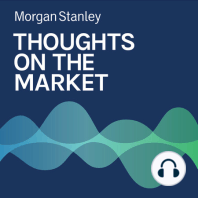3 min listen

Michael Zezas: Shifting Global Supply Chains
Michael Zezas: Shifting Global Supply Chains
ratings:
Length:
3 minutes
Released:
Oct 5, 2022
Format:
Podcast episode
Description
As globalization slows and companies begin to nearshore their supply chains, investors may be wondering what the costs and benefits are of bringing manufacturing back home.Important note regarding economic sanctions. This research references country/ies which are generally the subject of comprehensive or selective sanctions programs administered or enforced by the U.S. Department of the Treasury’s Office of Foreign Assets Control (“OFAC”), the European Union and/or by other countries and multi-national bodies. Any references in this report to entities, debt or equity instruments, projects or persons that may be covered by such sanctions are strictly informational, and should not be read as recommending or advising as to any investment activities in relation to such entities, instruments or projects. Users of this report are solely responsible for ensuring that their investment activities in relation to any sanctioned country/ies are carried out in compliance with applicable sanctions.----- Transcript -----Welcome the Thoughts on the Market. I'm Michael Zezas, Head of Global Thematic and Public Policy Research for Morgan Stanley. Along with my colleagues, bringing you a variety of perspectives, I'll be talking about the intersection between U.S. public policy and financial markets. It's Wednesday, October 5th, at 10 a.m. in New York. We speak often here about the themes of slowing globalization, or slowbalization, and the shift to a multipolar world. It's important to understand these megatrends, as they will likely impact global commerce for decades to come and in many ways we cannot yet anticipate. But one impact we have anticipated is multinational companies spending money to shift their supply chains. Whereas globalization meant companies could focus on lowering their labor and transportation costs through 'just in time' logistics, 'just in case' logistics are the watchword of the multipolar world. Companies will have to invest money to nearshore or friend shore to protect their supply chains from seizing up due to geopolitical conflicts, be it war, such as Russia invading Ukraine leading to sanctions, or the proliferation of policies by Western governments, preventing companies from producing and/or sourcing sensitive technologies overseas. Now, we're increasingly seeing evidence that this dynamic is already at play. Take Apple, for example, which, according to the Wall Street Journal, recently released a supplier list showing that in September of 2021, 48 of its suppliers had manufacturing sites in the U.S., up from 25 just a year before. The article goes on to cite several semiconductor chip makers who have recently opened US based sites. One company recently agreed to invest as much as $100 billion in a semiconductor manufacturing facility in upstate New York. Another announced plans to invest $20 billion for chip factories in Ohio. So it's clear that companies are starting to respond to geopolitical incentives. The long term public policy benefits of these moves could prove to be quite sound, but in the short term they're a challenge to markets. These investments cost money and represent elevated costs relative to what these companies would have enjoyed had the geopolitical environment not become more challenging. That means investors have to price in yet another margin pressure on top of the ones our colleague Mike Wilson continues to highlight in U.S. equities, from labor costs and the fed hiking rates to engineer slower economic growth. So bottom line for investors, shifting to a new geopolitical world order may be necessary, but it will cost something along the way. And for the moment, that means extra pressure on a U.S. equity market that's already got its fair share. Thanks for listening. If you enjoy the show, please share Thoughts on the Market with a friend or colleague, or leave us a review on Apple Podcasts. It helps more people find the show.
Released:
Oct 5, 2022
Format:
Podcast episode
Titles in the series (100)
Mike Wilson: Are U.S. Economic Indicators Flashing Yellow? by Thoughts on the Market